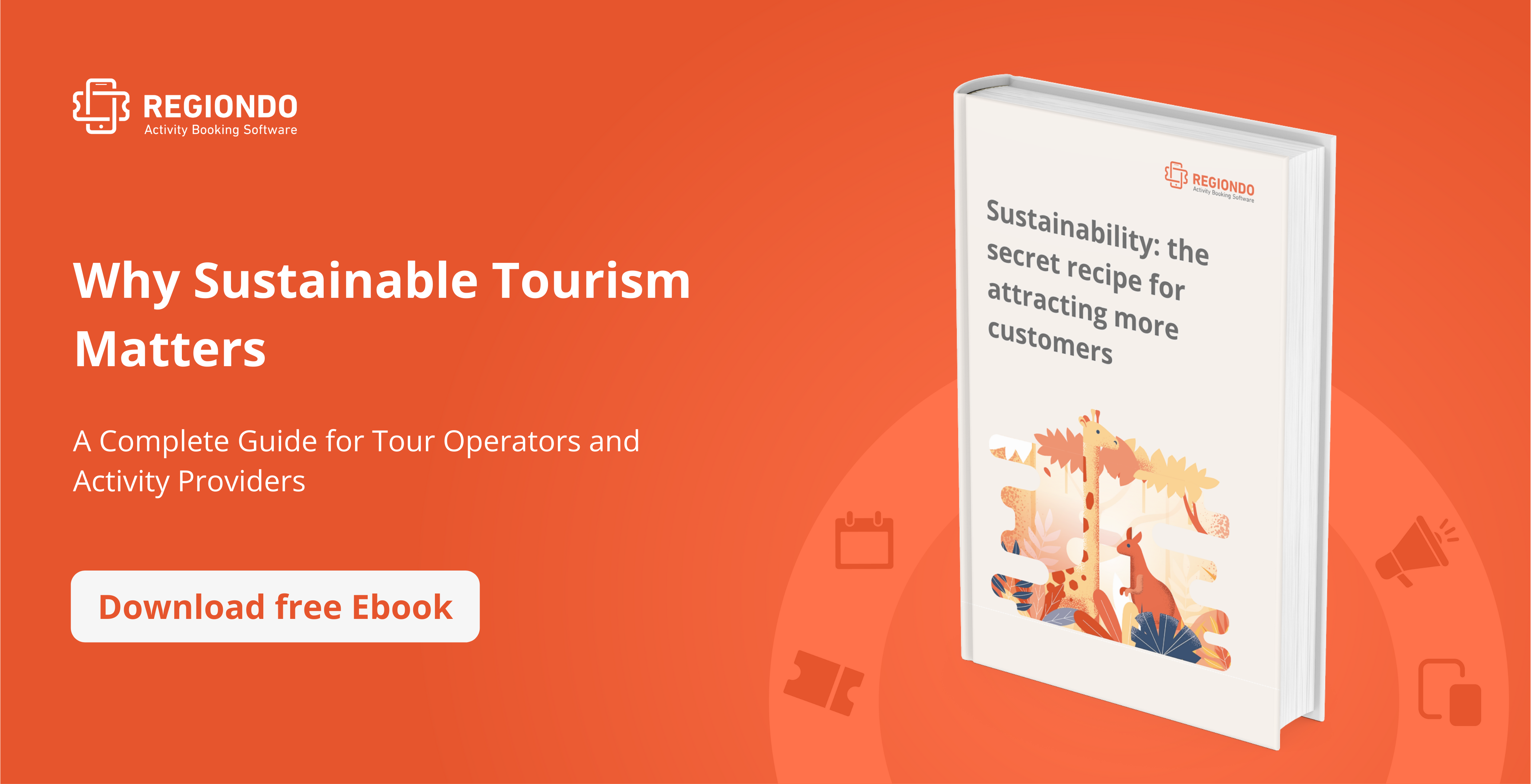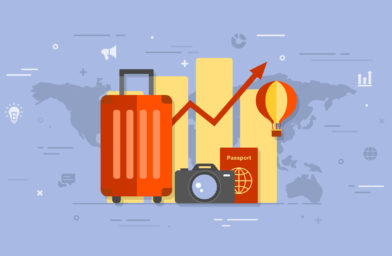The world of travel is experiencing an unprecedented era of transformation: as we enter 2024, the industry continues to deal with the aftermath of the global pandemic and adapt to new consumer behaviors, technological advancements and evolving market dynamics. In 2023, we have witnessed a robust recovery, with international travel volumes approaching pre-Covid levels. However, this doesn’t mean a return to the old ways, as customer preferences have changed significantly in recent years.
There is a growing appetite for personalized, flexible and sustainable travel options, with digital nomadism redefining the concept of both leisure and business travel, blurring the lines between the two. In addition, the rise of experiential tourism is shifting the focus from sightseeing to immersive cultural adventures. Sustainability has also moved from a niche consideration to a mainstream demand, as most people are increasingly aware of their environmental footprint and seek out eco-friendly accommodations and responsible travel experiences. This is more than a fad: it is a broader societal movement that is forcing the tourism industry to rethink its practices and offerings.
For tour operators and activity providers, staying abreast of these changes is essential to survival and growth. To better understand the travel trends that will shape the future of the industry in 2024, we interviewed over 100 industry professionals from all across Europe. This article is designed to accompany our infographic detailing their responses. We hope it will provide valuable insight into the key drivers behind their business strategies and offer actionable takeaways to help you replicate their success. Without further ado, let’s dive right in!
Digital Transformation in the Travel Industry
Tourism is undergoing a profound digital transformation, reshaping the way services are delivered and experienced. The emergence of smart technology in accommodations, such as IoT-enabled rooms, and the use of big data for personalized recommendations are examples of how technology is becoming an integral part of the travel experience itself. This integration presents an opportunity for providers to deliver unique value to their customers and stand out in a competitive marketplace.
The pivotal role of booking systems

Booking systems are at the heart of this digital revolution and have quickly become a critical interface between the supplier and the customer. Not surprisingly, 89% of respondents to our survey use them to easily manage bookings, sell tickets online and connect with leading OTAs. Let’s explore the top 5 features they find most beneficial in a booking system:
Key features of booking systems

- Online payments: Offering secure, versatile online payment options is essential. This includes accepting multiple payment methods such as credit cards, PayPal, and digital wallets to serve a global customer base.
- Dashboard calendar: An intuitive dashboard calendar facilitates the management of bookings, availability, and scheduling. This feature enables suppliers to stay organized and respond quickly to changes, minimizing overbooking and scheduling conflicts.
- Booking widget: A customizable booking widget on the supplier’s website allows the booking process to be seamlessly integrated into the user experience. This results in a smoother booking flow and encourages more direct bookings.
- Channel manager: With the proliferation of distribution channels, a channel manager becomes vital. It ensures real-time synchronization of availability across multiple platforms such as OTAs, the official website of the supplier and other portals, reducing the risk of overbooking and facilitating inventory management.
- Booking management: Efficient booking management includes features such as easy cancellations or changes, automated confirmation and reminder emails, and customer management tools. This improves the overall customer experience and operational efficiency.
As the leading booking system provider in Europe, Regiondo has been at the forefront of incorporating these essential features. The platform offers a comprehensive solution that not only addresses the basic needs of booking and payment processing, but also provides advanced tools such as resource management, marketing integrations and detailed analytics. This makes Regiondo a model for digital transformation in the travel industry, demonstrating how technology can facilitate business operations and enhance the customer journey. To learn more about how Regiondo can help your business thrive, book a demo with one of our consultants.
Sales Channels: Balancing the Old and the New
In 2024, the sales channels of the travel industry will continue to evolve: understanding how to balance them is key to maximizing reach and profitability.
Offline vs online dynamics
The travel industry has historically relied on a mix of offline and online distribution channels. While online channels have seen tremendous growth, especially in the wake of digital transformation, offline channels such as in-person travel agents and booking offices still play an important role, especially for certain markets and demographics.

Current balance: In our Trends 2024 survey, we asked participants to break down the share of sales they make online vs. offline. The weighted average shows that 56.67% of tickets are sold through digital channels, while the rest (43.33%) are sold through phone, in-person, and other offline channels. In summary, the current landscape is skewed towards online, driven by the convenience, accessibility and wide range of options it offers. However, offline continues to thrive by catering to customers who value personal interaction and customized service.
Future trends: The future points to a more integrated approach, with a growing emphasis on phygital experiences that blend physical and digital elements. For example, interactive digital displays in physical travel agencies could increase customer engagement.
Direct bookings vs resellers
Another issue we wanted our experts to weigh is their relationship with distribution partners. Specifically, we asked them to disclose the number of online bookings they receive through direct channels (website, official social media pages, emails) versus those received through resellers. The results paint a clear picture, with a weighted average of only 33% of tickets sold through intermediaries. But let’s take a closer look at the pros and cons of these two types of channels:
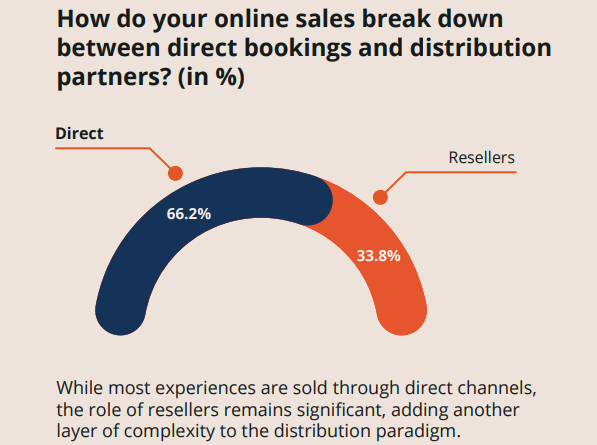
Direct Bookings
- Pros: Higher margins, direct relationship with customers, greater control over customer experience.
- Cons: In order to attract direct bookings, you need to invest in marketing, technology and a strong brand presence.
Resellers
- Pros: Extended reach, especially in markets where your brand has less presence; reduced marketing costs.
- Cons: Lower margins due to commissions, less control over the customer experience.
Leveraging Both
In our humble opinion, the key is to find the right balance. Leverage resellers to reach new markets and demographics, while building a robust direct booking strategy to drive customer loyalty and brand identity.
The Role of OTAs (Online Travel Agencies)
Among the various resellers, OTAs have become a dominant force in the travel booking landscape. As you know, they offer exposure to a huge audience, but at the cost of commissions. Speaking of which, we asked our survey participants about the average percentage of commission they pay to OTAs on each order. The results are interesting: 1 in 3 respondents said they don’t work with OTAs at all to save on these costs. As for the rest, the vast majority pay fees ranging from 20% to 29% of the price of their tickets.
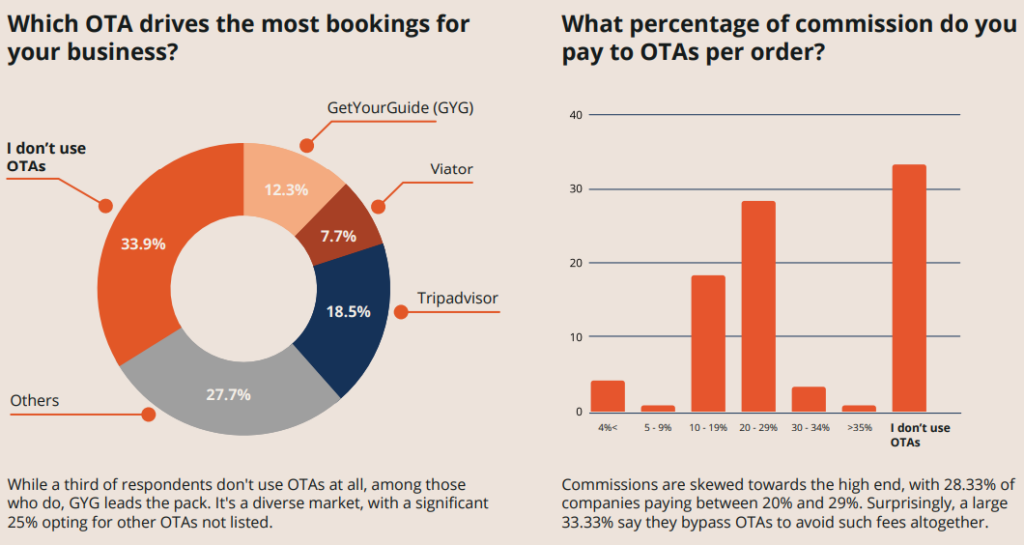
We also asked our industry experts to identify which OTAs drive the most bookings for them from a selection of the most popular. Their response highlights how fragmented the digital distribution landscape can be, as a quarter of respondents said the resellers they have the most lucrative relationships with are not on our list. Still, when it comes to the top dogs, this is the podium:
- GetYourGuide
- Viator
- TripAdvisor
Love ’em or hate ’em, OTAs continue to be a mainstay of the leisure industry, which is why we want to draw your attention to three important key elements that will help you get the most out of the commissions you pay:
- Perform a cost/benefit analysis: As we have seen, commissions can vary widely, typically ranging from 15% to 30%. It’s important to understand the cost/benefit ratio and how it impacts overall profitability.
- Negotiate: Negotiate better rates as your business grows, bundle services to increase the value of each booking, and use OTAs for visibility while encouraging repeat bookings through your direct channels.
- Follow these best practices: Ensure your listings are up-to-date and engaging, take advantage of OTA marketing tools and analytics, and tap into OTA platforms for market insights and trend analysis.
Marketing Channels and Strategies for 2024
As the travel landscape continues to evolve with ever-changing customer preferences, it can be difficult for tour and activity providers to understand the most effective marketing strategies to employ. So we asked our experts to list the marketing channels that drive more bookings for their businesses. Here are their top 5:
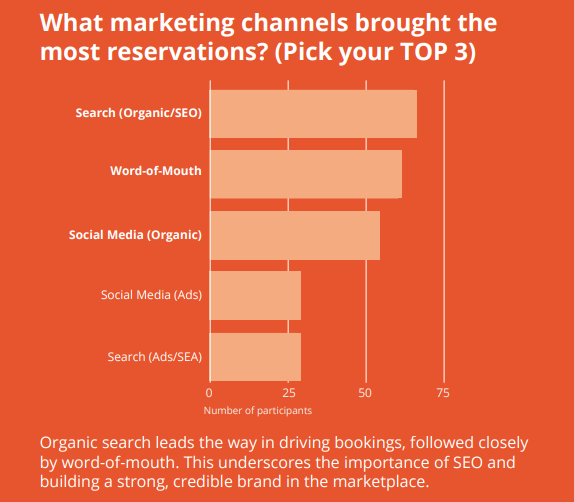
SEO (Search Engine Optimization)
SEO (66% of respondents) continues to be a cornerstone of digital marketing strategies. It’s critical for increasing visibility in search engine results, driving organic traffic and building online authority.
- Key areas of focus: Local SEO is especially important for travel businesses to ensure they appear in searches for local attractions and services. Optimizing for mobile and voice search is also essential as these trends continue to grow.
- Content marketing: Creating valuable, engaging content that answers potential travelers’ questions can significantly improve search rankings and drive organic traffic.
Word of mouth
Word of mouth (61% of respondents) is a powerful tool, especially in the digital age. It can happen organically or be encouraged through referral programs.
- Leverage social proof: Encourage happy customers to share their experiences online, whether through social media, blogs or video content.
- Referral programs: Implementing referral incentives can motivate past customers to spread the word to friends and family.
Social media (Organic)
Organic social media marketing (54% of respondents) is about building community and engaging authentically with your audience.
- Platform-specific strategies: Tailor content to the strengths and audience of each platform, whether it’s visually-driven Instagram, conversation-centric X (previously known as Twitter), or the increasingly popular TikTok.
- Engagement and community building: Posting regularly, interacting with followers, and creating shareable content are key strategies.
Social media and Search ads
Paid social media and search advertising (29% of respondents) is a critical component of a comprehensive marketing strategy.
- Targeted campaigns: Use the granular targeting options available on platforms like Facebook, Instagram, and Google to reach specific demographics, interests, and behaviors.
- Retargeting: Implement retargeting campaigns to capture prospects who have shown interest but haven’t yet booked.
Reviews
Online reviews (25% of respondents) continue to have a significant impact on consumer decisions in the travel industry.
- Online reputation management: Actively manage your presence on review platforms such as TripAdvisor, Google Reviews and Yelp.
- Encourage reviews: Encourage customers to leave reviews with follow-up emails or incentives. Respond to negative reviews promptly and professionally to maintain a positive reputation.
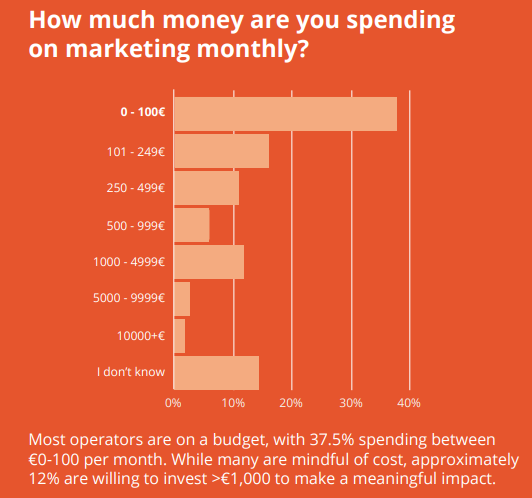
Budgeting
But how much should you spend on marketing? As a point of reference, the estimated average marketing budget for respondents to our survey is €972.82 per month. The key, however, is to take a balanced (no pun intended) approach. While it’s tempting to focus on the latest trends, it’s more important to allocate resources across channels based on their performance and your target audience. We recommend regularly reviewing and adjusting your marketing budget based on analytics and ROI. This may mean shifting funds from underperforming campaigns to those that are delivering better results, or investing in new platforms and technologies.

Conclusion
As we look ahead to 2024, the travel industry is at a pivotal crossroads, marked by rapid technological advances, changing consumer behavior and evolving market dynamics.
Key points:
- Digital transformation: The integration of technology into the travel experience, particularly through advanced booking systems such as Regiondo, is fundamental. The adoption of digital tools and features such as online payments, dashboard calendars, and AI-driven personalization can significantly improve efficiency and customer experience.
- Sales channels: A balanced approach between offline and online distribution channels, and between direct bookings and resellers (primarily OTAs), is critical for long-term success.
- Marketing strategies: The marketing landscape of 2024 will require a mix of advanced digital marketing, content marketing through storytelling, strategic influencer partnerships, local SEO optimization, and well-planned budget allocation across channels.
Looking ahead, the call to action for travel and activity providers is clear: adapt, innovate and thrive. Embrace digital transformation with open arms, understanding that technology is not just a tool, but a bridge to connect with and better serve your customers. Align your sales and marketing strategies to leverage multiple channels and respond to the changing needs and habits of travelers. Most importantly, stay attuned to your audience’s preferences and values to ensure your offerings resonate with their desire for unique, sustainable and culturally rich experiences.
The future of travel is bright and full of possibilities. Let’s embark on this journey together, innovating and evolving to create memorable experiences for tourists around the world.

